10 Classic Western Movies
10大经典西部片
By Laurie Boeder
文/劳丽·伯德
No film genre is more distinctly American than the western. Over the years, classic western movies have romanticized the Old West, vilified native Americans, idealized settlers and then switched all the stereotypes around again. Westerns come in all forms, from silent movies to full-on spoofs[1]. Here are ten classic westerns that are worth a look.
没有哪类影片比西部片更能体现美国特色。多年以来,经典西部片渲染了旧日西部的浪漫色彩,贬低丑化美洲原住民,美化定居者形象,此后又颠覆了所有传统的故事模式。从无声电影到夸张恶搞,西部片出现了各种各样的类型。下面推荐的十大经典西部片值得一看。
[1] spoof 戏仿。
High Noon, 1952
《正午》,1952年
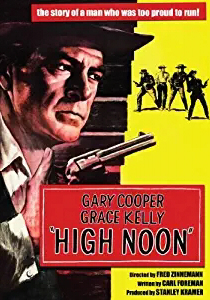
With Gary Cooper and a radiant Grace Kelly, High Noon is the tale of a dutiful sheriff deserted by the cowardly townspeople he has served as a gang of desperadoes descends on the town. Spare, tense, and told almost in real time, the film pares the conventional western to its bones as the sheriff stays to fight over the protests of his friends and his pacifist Quaker wife. Interpreted variously as a preachy liberal fable, an allegory of the McCarthy era and as a commentary on U.S. involvement in both Korea and WWII, it stands first and foremost as a fine, classic western movie.
《正午》由加里·库珀和光彩照人的格蕾丝·凯利主演,讲述匪帮来到小镇寻仇、现任警长尽忠职守却被懦弱居民抛弃的故事。本片情节简单,节奏紧张,近乎实时叙事。警长不顾朋友和热爱和平的贵格会教徒妻子的反对,决定留下来战斗的场景,浓缩了传统西部片的精华。虽然有各种各样的解读,比如宣扬自由主义的寓言、麦卡锡时代的隐喻,以及对美国卷入朝鲜战争和第二次世界大战的评价,不过本片首先是部出色的经典西部片。
Destry Rides Again, 1939
《碧血烟花》,1939年
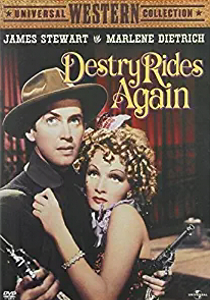
One of the great movies of 1939, Destry Rides Again is the story of a sheriff who doesn’t like to carry a gun. One of the first movies to spoof the western genre, it has the requisite lawless town, cheating gamblers, upright townsfolk, and rowdy cowpokes, along with the best dancehall hostess/fallen angel ever, Marlene Dietrich. (She gets three musical numbers, including “See What the Boys in the Back Room Will Have.”) Lanky, likable Jimmy Stewart is irresistible as Destry, the peaceable, slow-talking sheriff who tames the town.
这部1939年的电影佳作讲述了不爱带枪的警长的故事。作为最先恶搞西部片的电影之一,《碧血烟花》具备了各种经典元素:无法无天的小镇、出千骗人的赌徒、品行正直的民众和举止粗野的牛仔,还有风情万种的舞厅老板娘、“堕落天使”玛琳·黛德丽。(她在片中唱了三首歌曲,包括《看看幕后英雄会怎样》。)身材修长、讨人喜欢的吉米·斯图尔特饰演充满魅力的戴斯屈,这位性格温顺、讲话慢条斯理的警长给小镇带来了安宁。
The Searchers, 1956
《日落狂沙》,1956年
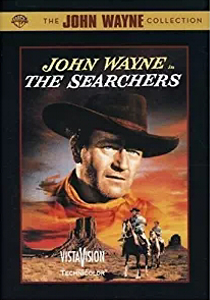
Shot by director John Ford against the spectacular vistas of Utah’s Monument Valley, The Searchers is a bleak tale of the violent struggle between settlers and Indians. John Wayne, who more often played genial cowboys and dashing soldiers, plays a darker, more complex role here as a vigilante who spends years in a single-minded, relentless search for the Indians who killed his brother’s family and kidnapped his niece. While not all of it holds up today, it remains a compelling, layered story. Wayne was never better.
导演约翰·福特拍摄的《日落狂沙》以犹他州纪念碑谷的壮丽景色为背景,讲述了定居者与印第安人激烈战斗的悲壮故事。约翰·韦恩往往饰演亲切友好的牛仔和英气勃勃的军人,在本片中塑造的角色却更阴暗复杂。这位复仇勇士多年来单枪匹马,对杀害哥嫂、掳走侄女的印第安人穷追不舍。虽然本片放在今天未必成功,不过故事情节依然引人入胜、层次分明。约翰·韦恩在本片中的表演达到了巅峰。
Blazing Saddles, 1974
《灼热的马鞍》,1974年
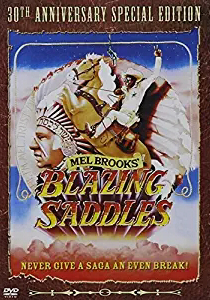
Mel Brooks’ beloved, laugh-out-loud western spoof Blazing Saddles was marketed with the tagline: “Never give a saga an even break.” Silly, crude and so politically incorrect no one would dare film it today, it features a noble black sheriff trying to win over the locals with the help of a laid-back drunken gunfighter, a dancehall floozy (Madeleine Kahn in a hilarious take on Marlene Dietrich) and former NFL great Alex Karas as a simple-minded frontier thug. It’s famous for the beans-around-the-campfire flatulence scene alone. (Watch it anyway.)
《灼热的马鞍》由梅尔·布鲁克斯执导,这部深受观众喜爱、令人捧腹的西部恶搞片还有句宣传口号:“永远不要给传奇机会。”本片荒唐可笑,情节粗俗,毫无政治正确性可言,放在今天没人敢拍这样的电影。该片讲述品格高尚的黑人警长在懒散的醉鬼枪手、舞厅妖姬(马德琳·卡恩的滑稽表演借鉴了玛琳·黛德丽的形象)和头脑简单的边野莽汉(前橄榄球联盟明星亚历克斯·卡拉斯饰演)的帮助下,努力赢得了当地民众的拥护。仅凭人们围着篝火吃豆子放屁的场景,这部电影就足以名留影史。(推荐观看。)
Butch Cassidy and the Sundance Kid, 1969
《虎豹小霸王》,1969年
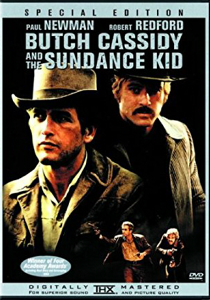
Something of a counterculture western, this beguiling film pairs two of Hollywood’s most watchable stars – Paul Newman and Robert Redford – as peaceable, old-school bandits trying to make it on the increasingly civilized frontier. With a warm, clever script by William Goldman, the movies follows Butch and Sundance as they seek adventure farther and farther south. Loosely based on the lives of real outlaws, the movie also features a standout[2] performance by Strother Martin.
这部反传统的西部片拍得引人入胜,由好莱坞最英俊迷人的两位电影明星——保罗·纽曼和罗伯特·雷德福——饰演性情温和的旧式匪徒,讲述他们设法在日益文明的边疆谋生的故事。影片根据威廉·戈德曼活泼俏皮的剧本,拍摄了布奇和圣丹斯一路向南闯荡的传奇经历。本片大致参照真实强盗的生活改编而成。斯特罗瑟·马丁在片中也有出色的表演。
[2] standout 突出的。
The Magnificent Seven, 1960
《豪勇七蛟龙》,1960年
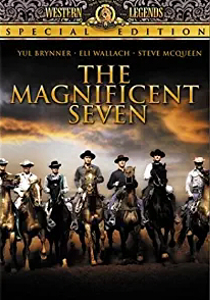
A western remake of Akira Kurosawa’s Japanese classic The Seven Samurai, The Magnificent Seven has Yul Brynner leading a band of gunslingers hired to protect a tiny Mexican village from the ravages of bandits who come to steal the crops and rape the women. Sparely told, it features standout performances from the exceptional cast, including Eli Wallach, James Coburn, Steve McQueen, Robert Vaughan and Charles Bronson. Horst Buchholz in heavy makeup as “Chico” is a little hard to take, but forgivable in an otherwise moving story.
《豪勇七蛟龙》翻拍自黑泽明导演的日本经典影片《七武士》,讲述墨西哥小村庄屡屡遭到强盗洗劫,村民的收成被抢走,妇女被强奸,于是雇用尤尔·伯连纳率领的枪手来保护村子。本片叙事平淡,演员阵容却极为豪华,埃里·瓦拉赫、詹姆斯·柯本、史蒂夫·麦奎因、罗伯特·沃恩和查尔斯·布朗森等明星都贡献了精彩的表演。霍斯特·巴克霍尔兹饰演的“奇科”化着浓妆,有点儿让人难以接受,不过影片故事感人,这一点也可忽略了。
The Good, the Bad and the Ugly, 1966
《黄金三镖客》,1966年

The most iconic of Italy’s “spaghetti” westerns, The Good, the Bad and the Ugly can be conjured in the mind with just a few notes of Ennio Morricone’s score. There’s Clint Eastwood (the good). Lee Van Cleef (the bad), and Eli Wallach (the ugly). A noose, a treasure, brutal violence, dark humor, double-dealing and a clever plot make this a must-see. The third in Sergio Leone’s “dollars” trilogy (A Fistful of Dollars, For a Few Dollars More), it assured Eastwood’s place as a western movie star.
这是最具代表性的意大利式西部片,只要听到恩尼奥·莫里科内创作的配乐,就会让人想到《黄金三镖客》。克林特·伊斯特伍德、李·范克里夫和埃里·瓦拉赫分别扮演“好人、坏人和丑人”。绞索、宝藏、残酷暴力、黑色幽默、双重交易和巧妙的情节,让本片成为必看的西部片。作为赛尔乔·莱昂内执导的“镖客三部曲”(前两部为《荒野大镖客》和《黄昏双镖客》)的第三部,本片奠定了伊斯特伍德西部片明星的地位。
Little Big Man, 1970
《小巨人》,1970年
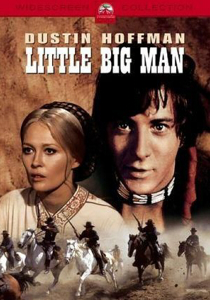
A quirky, counterculture satire that idealizes native Americans, Little Big Man turns the classic western epic upside down. Dustin Hoffman is superb as a young white settler kidnapped by the Indians and raised as one of them, who is abruptly “rescued” to return to the white world. He spends his long life between the two cultures, swinging between folly and tragedy, the only white survivor of Custer’s last stand. Faye Dunaway is a slyly lusty preacher’s wife, and Chief Dan George[3] all but walks away with[4] the movie as Little Big Man’s Indian grandfather.
《小巨人》是部情节离奇的反传统讽刺片,塑造了美洲原住民的理想形象,颠覆了经典西部史诗片的模式。达斯廷·霍夫曼的表演极为出色,他饰演的白人定居者年幼时被印第安人掠走,由他们抚养长大,突然被“解救”回到白人社会。他在两种文化中度过了漫长的一生,见识了各种荒唐事和悲剧,成为卡斯特最后战役中唯一幸存的白人。费·唐娜薇饰演狡猾强悍的牧师之妻。奇夫·丹·乔治饰演小巨人的印第安祖父,简直把这个角色演活了。
[3] 奇夫·丹·乔治凭借《小巨人》获得了奥斯卡最佳男配角提名。
[4] walks away with 轻易取胜;轻易获得。
Treasure of the Sierra Madre, 1948
《碧血金沙》,1948年
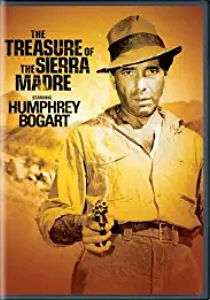
Humphrey Bogart was never better as he plays a venal American fortune hunter driven to madness by greed and suspicion in this classic set on the South American frontier. John Huston directed his own father, Walter Huston, to an Oscar for his performance as a grizzled prospector who teams with two American drifters and strikes it rich in the mountain wilderness. It features the classic line: “Badges? We don’t have to show you no stinkin’ badges!”
在这部以美国南部边境为背景的经典影片中,亨弗莱·鲍嘉的表演达到了巅峰水准,他饰演见利忘义的美国淘金者,因贪婪多疑而变得疯狂。导演约翰·休斯顿的父亲沃尔特·休斯顿饰演头发花白的淘金客,与两个美国流浪汉合伙在荒山野岭挖矿致富,他凭借本片获得了奥斯卡奖。这部影片有句经典台词:“警徽?我们用不着给你看什么臭警徽!”
Cat Ballou, 1965
《女贼金丝猫》,1965年
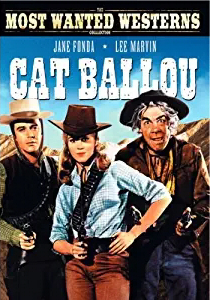
A rare Oscar for a comic performance went to Lee Marvin for his dual role as hopeless drunk Kid Shelleen and villainous gunslinger Silvernose in this fun, silly western spoof, enlivened by songs from the odd duo of Nat King Cole and Stubby Kaye. Starring Jane Fonda as the pretty schoolmarm, it’s an enjoyable send-up of the western genre, from outlaws to railroad barons.
很少有人以喜剧表演荣获奥斯卡奖,李·马文却凭借本片获此殊荣。在这部滑稽搞笑的西部片中,他一人分饰两角:没出息的醉鬼基德·谢利恩和坏蛋枪手“银鼻子”。纳特·金·科尔和斯塔比·凯这对奇怪的搭档演唱了数首插曲,也为影片增添了欢乐的气氛。本片以简·方达饰演的漂亮女教师为主角,对传统西部片(从不法之徒到铁路大亨)的搞笑模仿也极为有趣。








